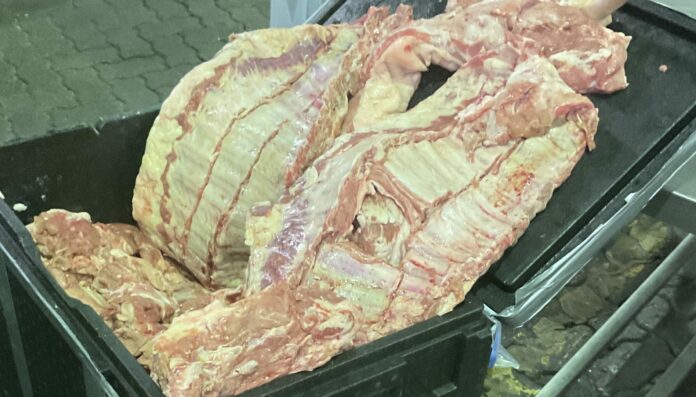The Dover Port Health Authority (DPHA) is facing a critical funding shortfall that could result in the cessation of vital checks for illegal meat at the Port of Dover within seven weeks. This alarming warning was delivered by Lucy Manzano, the head of port health and public protection at DPHA, during an evidence session in front of the Environment, Food and Rural Affairs Committee. Manzano highlighted the significant role DPHA plays in seizing illegal meat entering through Dover, contradicting Defra’s assertion that Border Force leads this effort.
With nearly 69 tonnes of seized meat out of a total of 71 tonnes in a year, DPHA operates at only 20% coverage due to financial constraints. Despite these limitations, the authority has managed to seize 170 tonnes of illegal meat since September 2022. However, the lack of funding for the 2025/26 financial year jeopardizes the continuation of these crucial operations. DPHA has submitted funding models to Defra, ranging from £6 million for 50% coverage to full 100% coverage, but has received no substantive response from the department.
Manzano emphasized the critical nature of the work carried out by DPHA, highlighting the complex process of seizing illegal meat and preventing it from reaching the market. The potential halt in checks could lead to illegal meat entering the food chain, posing serious risks to public health. Organized crime groups target the UK with illegal meat imports, exploiting loopholes in the border controls and evading detection.
In collaboration with Border Force, DPHA plays a primary role in seizing illegal meat products, with Border Force supporting these efforts. David Smith, Border Force’s south east regional director, underscored the resource-intensive nature of combating illegal meat imports and the need for additional funding to enhance enforcement capabilities. Border Force remains committed to addressing illegal meat imports, alongside other high-priority areas such as drugs and weapons.
Manzano also raised concerns about the government’s Border Target Operating Model (BTOM), pointing out flaws that allow unchecked commercial meat imports to enter the country in large volumes. The decision to conduct checks 22 miles inland at a new Border Control Post instead of at the point of entry poses significant challenges in monitoring and intercepting illegal meat shipments. DPHA has repeatedly emphasized the inadequacies of the current system and called for urgent reforms to strengthen border controls.
Moreover, Manzano highlighted the lack of communication and engagement from Defra, particularly in responding to outbreaks such as Foot and Mouth Disease (FMD). The absence of direct contact and collaboration between Defra and frontline authorities like DPHA hinders effective coordination and response to emerging threats. The need for improved communication and support from Defra is crucial to enhancing the effectiveness of border controls and safeguarding public health.
In conclusion, the funding shortfall facing DPHA poses a serious threat to the integrity of border controls and the safety of the food supply chain. Urgent action is needed to secure adequate funding and resources to enable DPHA to continue its vital work in seizing illegal meat imports and protecting public health. Collaboration between government agencies, enhanced communication, and targeted interventions are essential to address the challenges posed by organized crime and strengthen border controls at the Port of Dover.




